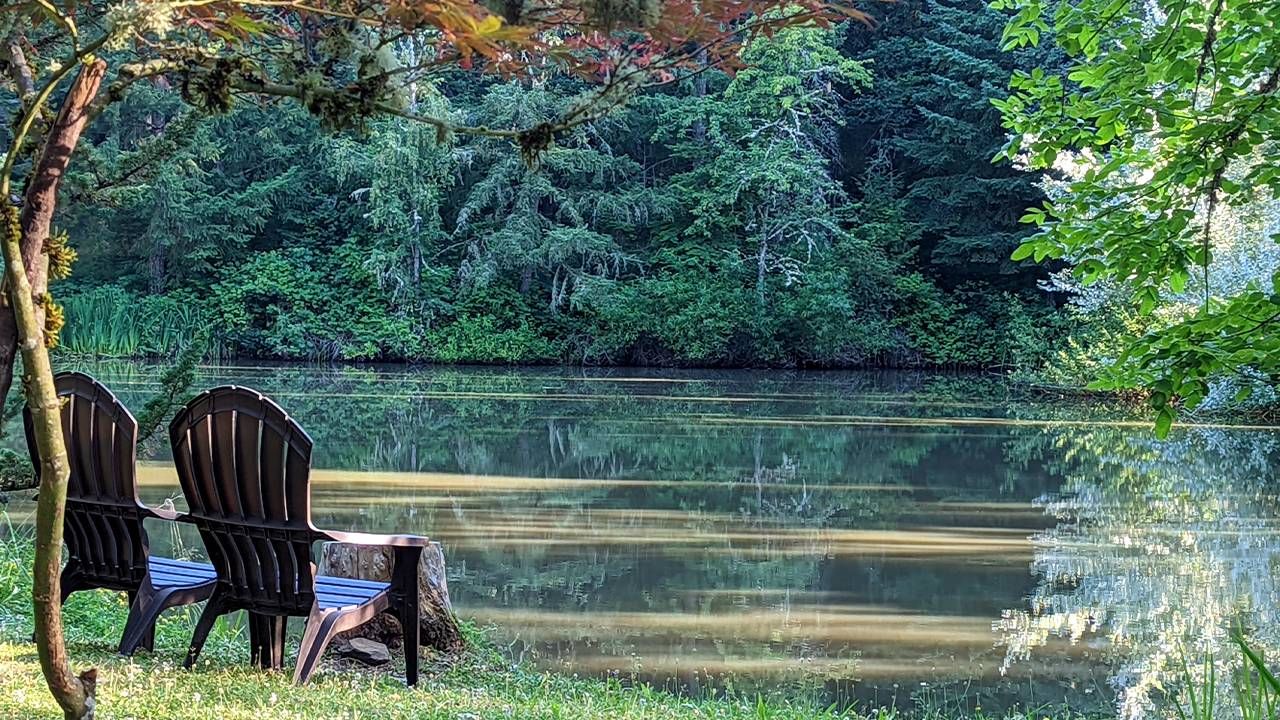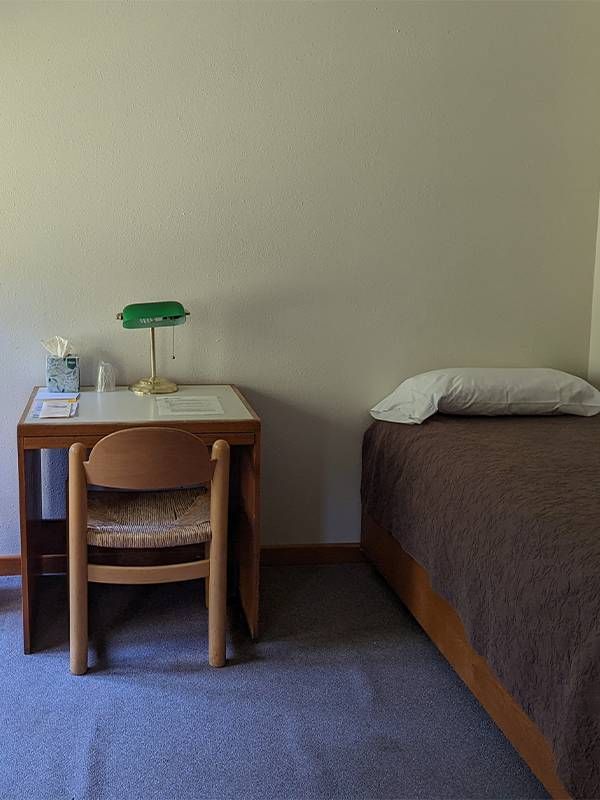The Benefits of Spiritual Retreats
Nature, simple surroundings and the chance to quiet 'the inner and outer voice' are all part of the appeal of a retreat
I'm not an Old Soul. Of all of the qualities I wish I had been born with — thicker hair, smaller feet, the ability to deliver a speech without medication — being an Old Soul tops the list.
No, I am undeniably on the Young Soul end of the wisdom-beyond-my-years spectrum. And, as I've aged, I've discovered (spoiler alert) that Old Souls do not spring organically from Old Bodies. So the "golden years," during which we can all expect a host of transitions and losses, have been particularly challenging for me. Throw in the past few years of existential crises — a multi-year pandemic, threats to democracy at home, the specter of a global recession — and my juvenile spirit is stretched to the breaking point.

Luckily, I have an antidote: When I sense that the world is crushing my soul, I go on retreat, for a few days of reflection and renewal. I think I've found Spiritual Retreat Nirvana at an unassuming Trappist monastery less than an hour's drive from my home. After a weekend in this semi-remote setting, I always emerge relaxed, refreshed — and just a tad wiser.
When I sense that the world is crushing my soul, I go on retreat, for a few days of reflection and renewal.
Sister Lillian Englert, spiritual director at the retreat center at St. Gertrude's Monastery in Cottonwood, Idaho, says I'm not alone in seeking out these refuges. "Retreats have definitely grown in popularity over these last decades," she says.
Why? Englert believes "people are hungering for spiritual food and focus in our culture of material goods and achievements." Sounds like the insight of an Old Soul to me.
Dozens of these welcoming cloistered communities dot the U.S. landscape. Our Lady of Guadalupe Trappist Abbey in Carlton, Oregon — the monastery I frequent — is one of several within driving distance of my home. Serendipitously, it's the closest and the best fit for me.
The Benefits of Spiritual Retreats
Englert says that among the many benefits of spiritual retreats are such things as "renewal of the heart and inner being," "seeing the world around and within with new eyes" and "a closer personal union with God" — or your higher power or, simply, humankind or nature.
As Englert notes, "we welcome people of all faiths and traditions as well as those with none." True for my go-to Trappist abbey as well.
Englert also emphasizes "the benefit overall to slowing down and to quieting both inner and outer voices." This downshifting of emotional and physical gears can elicit health benefits like enhanced immune systems and lower blood pressure, anxiety and depression levels.
The way I see it, the "slowing down" and "quieting" are both the means and the ends to one of these monastic time-outs. On a recent visit to my favorite monastery, I found the following amenities — all qualify as both process and product.
What Monastery Retreats Offer
Simplicity. Three simple, vegetarian meals are provided daily. Accommodations are basic and aesthetically spartan — but not uncomfortable. (No hair shirts required.) Each room contains a twin bed, desk, chair and comfy rocker. Kinda like Thoreau's cabin — with indoor plumbing.
Indeed, everything about a monastery stay is simple. This is by design. When life is whittled down to the essentials, wisdom and growth take root.
Disconnecting from the faux cyberworld allows reconnecting with the here-and-now — and your authentic self.
A dearth of distractions. A withdrawal from life in 2022 requires us to unplug, to step away from the persistent thrum of soul-sucking news feeds, alerts, texts, social media and more. My peaceful sanctuary does not offer wi-fi and cellphone reception is spotty. Disconnecting from the faux cyberworld allows reconnecting with the here-and-now — and your authentic self.
Quiet. The din of urban life is (blessedly) replaced with rural calm. Additionally, most monasteries request that silence be observed during your retreat, at least in certain areas. A pamphlet distributed at the abbey explains that, by embracing silence, we enter a state of "receptive quietude" where we're able to listen, "not only with our ears but our heart, our whole self."
After reading this little manual I feel encouraged. The monks are surely the experts at this retreating stuff, right? They conclude: "You need not be a monk for years and years in order to experience contemplative prayer; it is a form of prayer available to all." You too can become a modern-day mystic.
All of your needs are met. Food and lodging supplied. No dishes to wash, no menus to plan, no "to do" lists whatsoever. And no decisions to make, except whether you'll go for a walk, write in your journal or take a nap.
Nature. My little abbey — like most monasteries — has miles of hiking trails replete with towering firs, oaks and pines. I can walk quietly through all of this beauty or sit in the shade by one of the ponds, listening to the birdsong and breathing deeply .

Spiritual assistance (but only if requested). You can schedule a session with a monk if you'd like (no charge) and a chapel is onsite with services that all are welcome to attend. Even if you're emphatically agnostic/atheist, listening to monks chanting can — in and of itself — be a spiritual experience.
The Rule of St. Benedict. A little background: St. Benedict of Nursia, the 6th century founder of the Benedictine order of monks, wrote a comprehensive manual for monastery life. One of his guidelines is followed at basically all monasteries, whether Benedictine or not: "Let all guests who arrive be received like Christ."
In practice the Rule of St. Benedict ends up meaning that all guests are unconditionally accepted and loved. This is, for me, the most important benefit of a spiritual retreat. I'm pretty much an agnostic, lapsed Catholic. But the idea that everyone (EVERYONE!) is welcomed and treated as, you know, the cat's pajamas, is not lost on me. Right from the outset I'm reminded that all eight billion people on the planet are of equal worth. This essential truth is the best place to start as I try to discern my place and purpose in the world.
Another facet of this rule is that typically no one is turned away from these sanctuaries for want of funds. (Although, the recommended room rates are generally affordable. My "all-inclusive" Trappist abbey experience is only $80/night. St. Gertrude's asks $125/night. That range is pretty typical.)
What to Bring to a Retreat
You don't need to bring much. In fact, the less, the better. Englert says, "Just make the choice to come, be open to listen and respond, to lean into the mystery…"
I take along books, my journal and very comfortable clothing. Surrounded and embraced by nature and a loving community, I slow down, I ponder, I (dare I say it?) grow a bit.
It's not like I Figure It All Out during one of these retreats and, bam, I'm done. No, I'm human and — remember? — a Young Soul to boot. I try, I fail, I regroup and try again.
And, just maybe, I make a little progress toward Old Soul status.


